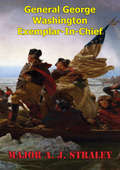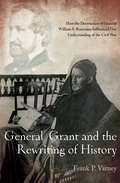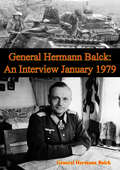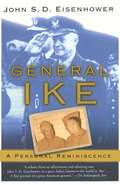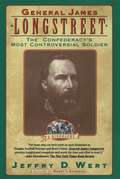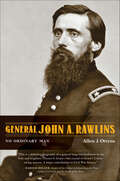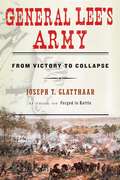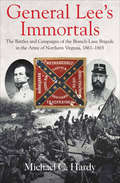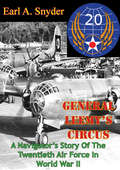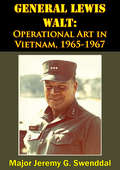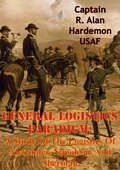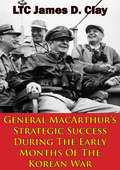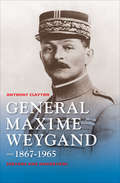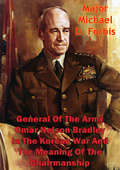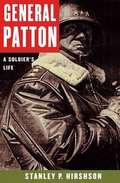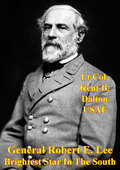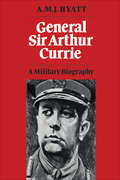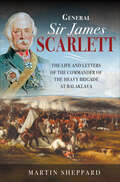- Table View
- List View
General George Washington; Exemplar-in-Chief: A Historical Analysis Of George Washington’s Influence On The Early Continental Army And Civil Military Relations
by Major A. J. StraleyGeorge Washington was an "Exemplar-in-Chief" who had an indelible influence on the nature and character of the early Continental Army, an influence that set the precedence and affected how the United States military would interact with civil authority under the new institution of a democratic republic.Through an analysis of the historical record there are multiple examples of George Washington's early influence in shaping the nature and character of the United States military. Today's American military is a direct descendant of the early Continental Army which fought the War for Independence, and was shaped by Washington's influence. In analyzing Washington's motives, actions, to include correspondence and court martial rulings, this study will attempt to open a window into understanding Washington's influence on the Continental Army and, therefore, the American military tradition among the officer corps to the present day.Washington was not just a Command-in-Chief, but an Exemplar-in-Chief who left a lasting impression on the American military structure, that has held strong for over two hundred years. Through his actions during the creation of the army and leading that army during the Revolution, he forever set the framework for the civil-military tradition which has never seen a credible or serious military coup. The character and nature of today's military will not permit an environment that would allow a military coup to begin. This character and nature is a direct result of the profound significance of George Washington's motives in joining the cause and his actions during the struggle. Washington's influence is not only significant.... it cemented the military subordination to civilian authority which has lasted till today.
General Grant and the Rewriting of History: How the Destruction of General William S. Rosecrans Influenced Our Understanding of the Civil War
by Frank P. VarneyIn 1885, a former president of the United States published one of the most influential books ever written about the Civil War. An entire generation of Americans had eagerly awaited his memoirs and it has remained so popular that it has never gone out of print. Historiansthen and now have made extensive use of Grants recollections, which have shaped how we understand and evaluate not only the Union armys triumphs and failures, but many of the wars key participants. TheMemoirsof Ulysses Simpson Grant may be a superbly written book, Frank P. Varney persuasively argues in General Grant and the Rewriting of History, but is so riddled with flaws as to be unreliable.Juxtaposing primary source documents (some of them published here for the first time) against Grants own pen and other sources, Professor Varney sheds new light on what really happened on some of the Civil Wars most important battlefields. He does so by focusing much of his work on Grants treatment of Maj. Gen. William S. Rosecrans, a capable army commander whose reputation Grant (and others working with him) conspired to destroy. Grants memoirs contain not only misstatements but outright inventions to manipulate the historical record. But Grants injustices go much deeper. He submitted decidedly biased reports, falsified official documents, and even perjured himself before an army court of inquiry. There is also strong evidence that his often-discussed drinking problem affected the outcome of at least one battle.General Grant was an outstanding soldier and, so we have long believed, a good man. Historys wholesale acceptance of his version of events has distorted our assessment of Rosecrans and other officers, and even of the Civil War itself. Grant intentionally tried to control how future generations would remember the Civil War, and in large measure he succeeded. The first of two volumes on this subject, General Grant and the Rewriting of History aptly demonstrates, however, that blindly accepting historical truths without vigorous challenge is a perilous path to understanding real history.
General He Yingqin
by Peter WorthingA revisionist study of the career of General He Yingqin, one of the most prominent military officers in China's Nationalist period (1928–1949) and one of the most misunderstood figures in twentieth-century China. Western scholars have dismissed He Yingqin as corrupt and incompetent, yet the Chinese archives reveal that he demonstrated considerable success as a combat commander and military administrator during civil conflicts and the Sino-Japanese War. His work in the Chinese Nationalist military served as the foundation of a close personal and professional relationship with Chiang Kai-shek, with whom he worked closely for more than two decades. Against the backdrop of the Nationalist revolution of the 1920s through the 1940s, Peter Worthing analyzes He Yingqin's rise to power alongside Chiang Kai-shek, his work in building the Nationalist military, and his fundamental role in carrying out policies designed to overcome the regime's greatest obstacles during this turbulent period of Chinese history.
General Hermann Balck: An Interview January 1979
by General Hermann BalckThis work provides an interesting view of German as well as enemy operations, tactics, strategies, equipment, weapons, and more, through an interview with a little-known but highly capable panzer general of the Wehrmacht, who saw considerable service in Europe and the Eastern Front during the war. Includes a brief biographical sketch of General Balck.
General Ike
by John EisenhowerJohn S.D. Eisenhower modestly explains General Ike as "a son's view of a great military leader -- highly intelligent, strong, forceful, kind, yet as human as the rest of us." It is that, and more: a portrait of the greatest Allied military leader of the Second World War, by the man who knew Ike best. General Ike is a book that John Eisenhower always knew he had to write, a tribute from an affectionate and admiring son to a great father. John chose to write about the "military Ike," as opposed to the "political Ike," because Ike cared far more about his career in uniform than about his time in the White House. A series of portraits of Ike's relations with soldiers and statesmen, from MacArthur to Patton to Montgomery to Churchill to de Gaulle, reveals the many facets of a talented, driven, headstrong, yet diplomatic leader. Taken together, they reveal a man who was brilliant, if flawed; naÏve at times in dealing with the public, yet who never lost his head when others around him were losing theirs. Above all, General Ike was a man who never let up in the relentless pursuit of the destruction of Hitler. Here for the first time are eyewitness stories of General Patton showing off during military exercises; of Ike on the verge of departing for Europe and assuming command of the Eastern Theater; of Churchill stewing and lobbying Ike in his "off hours." Faced with giant personalities such as these men and MacArthur, not to mention difficult allies such as de Gaulle and Montgomery, Ike nevertheless managed to pull together history's greatest invasion force and to face down a determined enemy from Normandy to the Bulge and beyond. John Eisenhower masterfully uses the backdrop of Ike's key battles to paint a portrait of his father and his relationships with the great men of his time. General Ike is a ringing and inspiring testament to a great man by an accomplished historian. It is also a personal portrait of a caring, if not always available, father by his admiring son. It is history at its best.
General Jacob Devers: World War II's Forgotten Four Star
by John A. AdamsA &“solid and informative&” biography of one of the overlooked heroes of the Second World War (Wall Street Journal). Of the leaders of the American Army in World War II, Jacob Devers is undoubtedly the &“forgotten four-star.&” Plucked from relative obscurity in the Canal Zone, Devers was one of four generals selected by General of the Army George Marshall in 1941 to assist him in preparing the Army for war. He quickly became known in Army circles for his &“can do&” attitude and remarkable ability to cut through red tape. Among other duties, he was instrumental in transforming Ft. Bragg, then a small Army post, into a major training facility. As head of the armored force, Devers contributed to the development of a faster, more heavily armored tank, equipped with a higher velocity gun that could stand up to the more powerful German tanks, and helped to turn American armor into an effective fighting force. In spring 1943, Devers replaced Dwight Eisenhower as commander of the European Theater of Operations, then was given command of the 6th Army Group that invaded the south of France and fought its way through France and Germany to the Austrian border. In the European campaign to defeat Hitler, Eisenhower had three subordinate army group commanders: British Field Marshall Bernard Montgomery, Omar S. Bradley, and Jacob Devers. The first two are well-known; here the third receives the attention he properly deserves.
General James Longstreet: The Confederacy's Most Controversial Soldier
by Jeffry D. WertGeneral James Longstreet fought in nearly every campaign of the Civil War, from Manassas (the first battle of Bull Run) to Antietam, Fredericksburg, Chickamauga, Gettysburg, and was present at the surrender at Appomattox. Yet, he was largely held to blame for the Confederacy's defeat at Gettysburg. General James Longstreet sheds new light on the controversial commander and the man Robert E. Lee called “my old war horse.”
General John A. Rawlins: No Ordinary Man
by Allen J. OttensNo one succeeds alone, and Ulysses S. Grant was no exception. From the earliest days of the Civil War to the heights of Grant's power in the White House, John A. Rawlins was ever at Grant's side. Yet Rawlins's role in Grant's career is often overlooked, and he barely received mention in Grant's own two-volume Memoirs. General John A. Rawlins: No Ordinary Man by Allen J. Ottens is the first major biography of Rawlins in over a century and traces his rise to assistant adjutant general and ultimately Grant's secretary of war. Ottens presents the portrait of a man who teamed with Grant, who submerged his needs and ambition in the service of Grant, and who at times served as the doubter who questioned whether Grant possessed the background to tackle the great responsibilities of the job. Rawlins played a pivotal role in Grant's relatively small staff, acting as administrator, counselor, and defender of Grant's burgeoning popularity. Rawlins qualifies as a true patriot, a man devoted to the Union and devoted to Grant. His is the story of a man who persevered in wartime and during the tumultuous years of Reconstruction and who, despite a ravaging disease that would cut short his blossoming career, grew to become a proponent of the personal and citizenship rights of those formerly enslaved. General John A. Rawlins will prove to be a fascinating and essential read for all who have an interest in leadership, the Civil War, or Ulysses S. Grant.
General Lee's Army: From Victory to Collapse
by Joseph Glatthaar"You would be surprised to see what men we have in the ranks," Virginia cavalryman Thomas Rowland informed his mother in May 1861, just after joining the Army of Northern Virginia. His army -- General Robert E. Lee's army -- was a surprise to almost everyone: With daring early victories and an invasion into the North, they nearly managed to convince the North to give up the fight. Even in 1865, facing certain defeat after the loss of 30,000 men, a Louisiana private fighting in Lee's army still had hope. "I must not despair," he scribbled in his diary. "Lee will bring order out of chaos, and with the help of our Heavenly Father, all will be well." Astonishingly, after 150 years of scholarship, there are still some major surprises about the Army of Northern Virginia. In General Lee's Army, renowned historian Joseph T. Glatthaar draws on an impressive range of sources assembled over two decades -- from letters and diaries, to official war records, to a new, definitive database of statistics -- to rewrite the history of the Civil War's most important army and, indeed, of the war itself. Glatthaar takes readers from the home front to the heart of the most famous battles of the war: Manassas, the Peninsula campaign, Antietam, Gettysburg, all the way to the final surrender at Appomattox. General Lee's Army penetrates headquarters tents and winter shanties, eliciting the officers' plans, wishes, and prayers; it portrays a world of life, death, healing, and hardship; it investigates the South's commitment to the war and its gradual erosion; and it depicts and analyzes Lee's men in triumph and defeat. The history of Lee's army is a powerful lens on the entire war. The fate of Lee's army explains why the South almost won -- and why it lost. The story of his men -- their reasons for fighting, their cohesion, mounting casualties, diseases, supply problems, and discipline problems -- tells it all. Glatthaar's definitive account settles many historical arguments. The Rebels were fighting above all to defend slavery. More than half of Lee's men were killed, wounded, or captured -- a staggering statistic. Their leader, Robert E. Lee, though far from perfect, held an exalted place in his men's eyes despite a number of mistakes and despite a range of problems among some of his key lieutenants. General Lee's Army is a masterpiece of scholarship and vivid storytelling, narrated as much as possible in the words of the enlisted men and their officers.
General Lee's Immortals: The Battles and Campaigns of the Branch-Lane Brigade in the Army of Northern Virginia, 1861–1865
by Michael C. HardyTwo decades after the end of the Civil War, former Confederate officer Riddick Gatlin bewailed the lack of a history of the famous Branch-Lane Brigade, within which he had served. Who has ever written a line to tell of the sacrifices, the suffering and the ending of these more than immortal men? he said. Why has the history of that brigade not been written? With the publication of General Lees Immortals: The Battles and Campaigns of the Branch-Lane Brigade in the Army of Northern Virginia, 1861-1865, Gatlins long wait is finally over.This storied brigade, first led by Lawrence Branch until his death at Sharpsburg, and then James H. Lane, served with Lees Army of Northern Virginia during its entire existence. The names emblazoned on its battle flag read like a history of that army, beginning with the Seven Days Battles and ending with the final roll call at Appomattox. Originally part of A.P. Hills famous Light Division, the Branch-Lane Brigade earned spectacular plaudits for its disciplined defense, hard-hitting attacks, and incredible marching abilities. Its constant position at the front, however, resulted in devastating losses, so that its roll call of casualties by the end of the war far exceeded its number of survivors.In this deeply researched work we witness the experiences of North Carolinas Branch-Lane Brigade in nearly every major battle fought in the east, including that infamous day at Chancellorsville when its members mistakenly shot Stonewall Jackson. Two months later they were in Picketts Charge at Gettysburg, and thereafter throughout the titanic battles of 1864. In the meantime we learn of the camp-life and the hard winters of Lees army. Yet when Lee finally surrendered at Appomattox it was the Branch-Lane Brigade still with him, no longer victors but yet unbowed.Michael Hardys General Lees Immortals is the first comprehensive history of the Branch-Lane Brigade, and fully meets Captain Gatlins challenge by setting forth the complete story of these more than immortal men. His study is based on many years of study and grounded on a vast foundation of sources that relate every aspect of the career of this remarkable fighting command. Once finished, every reader will come to think he has met, marched with, fought beside, and bled with these North Carolinians.
General Leemy’s Circus: A Navigator’s Story Of The Twentieth Air Force In World War II [Illustrated Edition]
by Earl A. SnyderIncludes The Bombing Of Japan During World War II illustrations pack with 120 maps, plans, and photosTHIS IS the dramatic, uninhibited account of the human side of the air war in the Pacific and of the men who flew the Superforts, the B-29s of General Curtis LeMay's XXI Bomber Command, straight to the heart of Japan.Earl Snyder was a navigator on the B-29 Umbriago-Dat's My Boy, and took part in the first B-29 raid on Tokyo. But, he recalls nervously, his crew didn't drop their bombs on the Japanese capital, because at 29,000 feet the air was so cold that the bomb-release mechanism had frozen. "Umbriago" made it back to the base at Saipan with the fuel gauges registering "less than empty."This is not a biography of General LeMay--or "General Leemy," as the Japs called him--it's the story of the airmen who carried out his orders, flew the missions and lived or died without asking "too many questions."General Leemy's Circus is a tribute to those men and, at the same time, an exciting record of their everyday lives. Writing with stark realism, Snyder hands the reader a share of the dangers and thrills, the devil-may-care, sometimes hilarious, adventures of men without women, and of the sordidness and the glory of air war.
General Lee’s Photographer: The Life and Work of Michael Miley
by Dr Marshall FishwickAs award-winning popular culture author, scholar, and fellow Virginia native Dr. Marshall Fishwick himself states in his introductory pages, “This book is about a Southerner of the Reconstruction period whose work has been almost completely ignored to date. His name was Michael Miley, and his field was photography. The record of his life and of his work indicates that he deserves a distinctive place for both his scientific contributions and his aesthetic achievements in this field.”Michael Miley (1841-1918) was born in Rockingham County, Virginia, and while still young moved south onto a farm in Rockbridge County. Following his service in General Thomas J. Jackson’s “Stonewall Brigade” during the war, he began his photographic career. Portraiture would go on to comprise the majority of Michael Miley’s work, with his famous images of Robert E. Lee as popular then as they are now.
General Lewis Walt: Operational Art in Vietnam, 1965-1967
by Major Jeremy G. SwenddalThis study investigates the significant effect of mobility, counter-mobility, survivability, and topographic engineering on the American Civil War Campaign of Chancellorsville. The operations occurred near Fredericksburg, Virginia, in April and May of 1863. In the battle, the Confederate Army of Northern Virginia decisively defeated the Union Army of the Potomac. Engineer-related considerations contributed immensely to the Confederate victory.Engineer battlefield functions influenced the operations of both armies. The Union Engineer Brigade constructed numerous pontoon bridges to overcome the river obstacles prior to and following the battle. This capability allowed the Union Army to initially surprise and envelop the Confederate Army. The natural obstacles of the rivers and forests and manmade obstacles of abatis hindered maneuver. Survivability was a significant factor during the fighting. At Chancellorsville, the Confederates used entrenchments for the first time in open operations. This strengthened their economy of force in front of the Union Army and gave "Stonewall" Jackson mass during his successful enveloping attack. Finally, topographic engineering was important through map production and reconnaissance by engineers.This study concludes that the Confederate Army integrated the engineer battlefield functions more effectively than the Union Army. In part, this explains the decisive Confederate victory.
General Logistics Paradigm: A Study Of The Logistics Of Alexander, Napoleon, And Sherman
by Captain R. Alan Hardemon USAFThis study examines the campaigns of Alexander the Great, Napoleon Bonaparte and William T. Sherman. By analyzing the influences of the logistics policies and practices employed during these campaigns common underlying logistics principles are identified. The resultant logistics principles are then codified into a logistics paradigm to be used when developing and managing operational level logistics.Using an analysis schema that employs inductive reasoning, principles of historical analysis and critical thinking, each of the three campaigns is analyzed to identify events of interest. The events of interest are specific occurrences during the campaign when what occurred was directly influenced by logistics or logistics, policies and practices were influenced by what occurred. Using a modified version of the Threads of Continuity approach to the study of history, four key logistics principles are identified: centralized control/decentralized execution, flexibility, the proper application of technology, and understand the environment.The four principles are then codified into a general logistics paradigm. The viability and the application of the paradigm are discussed. Additionally, previous logistics principles from different authors are described and compared to the paradigm offered in this thesis.
General MacArthur’s Strategic Success During The Early Months Of The Korean War
by LTC James D. ClayMany military professionals regard General of the Army Douglas MacArthur as a very polarizing figure in military history, from his strategic use of maneuver to defeat the Japanese at Leyte to his public defiance of the Commander in Chief, President Truman on his policy towards the Korean War. Seen by many as a tactical genius, while others viewed him as an egomaniac, General MacArthur exhibited both sides of this complex character, but the evidence shows that MacArthur possessed a level of military competence that set him apart from his contemporaries. In 1950, MacArthur demonstrated one of his most embarrassing defeats as well as one of his most brilliant successes within the course of ten weeks. MacArthur exemplifies a level of confidence that earned him the modern reputation as an operational artist from his ability to turn the tide of war and restore South Korea's sovereignty.
General Maxime Weygand, 1867-1965: Fortune and Misfortune (Encounters: Explorations in Folklore and Ethnomusicology)
by Anthony ClaytonThis lively biography of the French military commander chronicles his legendary and controversial career through WWI, WWII, and beyond. The extraordinary life of General Maxime de Nimal Weygand offers a fascinating glimpse into the perils and politics of 20th century French military leadership. From obscure origins, Weygand rose to a distinguished career as chief of staff for Marshal Foch during World War I and continued to serve his country after the war in Poland and Syria. Alarmed by Nazi Germany&’s prodigious rearmament, Weygand locked horns with politicians who were blind to the growing military threat. In fact, he faced accusations that his desire for a strong army was anti-democratic. With German invaders again threatening Paris, Weygand argued for armistice rather than face certain military defeat. During Nazi occupation, he was no friend of the newly-installed Vichy government, and was sent to North Africa. There, he plotted the army&’s return to the Allied cause and was imprisoned. Released at wars end, he was rearrested on the orders of Charles de Gaulle and afterwards fought to restore his name. In this concise biography, Anthony Clayton traces the vertiginous changes in fortune of a soldier whose loyalty to France and to the French army was unwavering.
General Of The Army Omar Nelson Bradley In The Korean War And The Meaning Of The Chairmanship
by Major Michael D. ForbisThe Korean War took place over a three year period from 25 June 1950 to 27 July 1953. The first year experienced the major operations of the entire war, and the remaining two years of the war basically resulted in a stalemate along the 38th Parallel until the armistice. The period of the Korean War was a delicate time in United States history, and the war was part of a larger global problem facing the country with regards to the expansion of communism. General of the Army Omar Nelson Bradley served as the first Chairman of the Joint Chiefs of Staff from 16 August 1949 to 15 August 1953. During this time in his career, his duty as Chairman overlapped with the Korean War from the initial invasion on 25 June 1950 to the signing of the armistice on July 1953. Bradley's position as Chairman was part of the modern day Department of Defense unifying the service chiefs of the armed forces. The Chairman position was the senior military advisor to the President of the United States and the Secretary of Defense. During Bradley's four year term in this position, he served under both Presidents Harry S. Truman and Dwight D. Eisenhower. Bradley also served with the Secretaries of Defense Louis Johnson, George Marshall, and Robert Lovett. During the Korean War, General of the Army Douglas MacArthur and General Matthew Ridgway served as the Far East Commanders.
General Patton: A Soldier's Life
by Stanley P. Hirshson"War is my work and I know I sound sometimes as though I liked it; perhaps I do -- how can I tell? -- but this war hurts everybody. " -- Patton to Henry J. Taylor, 1945. General George S. Patton, Jr. , an inspirational leader and outstanding tactician, has intrigued and confounded his biographers. Now, utilizing untapped archival materials in both the United States and England, government documents, family papers, and oral histories, Stanley P. Hirshson creates the most balanced portrait of Patton ever written. It reveals Patton as a complex soldier capable of brilliant military maneuvers but also of inspiring his troops with fiery speeches that resulted in horrendous acts, such as the massacres of Italian civilians, It explains Patton's belief in a soldiers Valhalla, connects the family's wealth to one of Americas bitterest labor strikes, and disputes the usual interpretation of Patton's relief from command of the Third Army. In investigating this complex man, Hirshson has uncovered surprising material about a series of civilian massacres in Sicily, about the two slapping incidents, about attempts to exploit Patton's diary after his death, and about Patton's relations with top Allied generals. Patton emerges as a soldier of great imagination and courage, and his military campaigns make for edge-of-the-seat reading. All the drama of Patton's life comes alive in this meticulously documented volume.
General Philip Kearny: Battle Soldier of Five Wars
by Thomas KearnyPhilip Kearny, lover of brave soldiers, colorful uniforms, and beautiful horses, has at last found a tolerable biography. Thomas Kearny's recent book is quite obviously the result of serious research into important sources hitherto unused. The dashing personality of Philip Kearny, the romantic hero who figured in five wars, is vividly portrayed. Kearny saw service with the French in Africa, the United States in Mexico, fought the Indians of the Northwest more than once, and served the Union in the War between the States. In each of these wars he performed creditable and often brilliant service.Too often a writer of biography makes the principal character the hero or the villain. In this case Philip Kearny is ever the hero. Whether fighting, writing his severe criticism of his fellow officers—Generals Casey, Hintzelman, and McClellan, or expressing his belief that the annexation of Texas and the Mexican War were brought about by the machinations of an aggressive slaveocracy whose continued existence and wellbeing they were designed to advance, Kearny is ardently supported by his biographer.However, in spite of the tendency to idolize his subject, Thomas Kearny has produced a worthwhile and much needed biography. In conclusion it should be remarked that this biography is more than a history of the life of Philip Kearny for it includes also some account of the more prominent and historically important members of the Kearny family. The author in particular portrays the brilliant campaign of Stephen Kearny across New Mexico to California, bringing that enormous country under the control of the United States.-George D. Harmon
General Robert E. Lee - Brightest Star In The South
by Lt Col. Kent B. DaltonHistory is often overlooked for its value in terms of lessons learned. By examining General Robert E. Lee's distinctive application of operational art and leadership as the commander of the Army of Northern Virginia, we can discern many lessons which are still pertinent to our commanders at the operational level today. From his selection of Lieutenant General Thomas "Stonewall" Jackson as one of his corps commanders during his reorganization of the Army of Northern Virginia, his methods to build morale to his strategy and his balancing of Space, Time and Force there are many lessons to be learned.
General Roy S. Geiger, USMC Marine Aviator, Joint Force Commander
by Major James B. Wellons USMCThis work comprises an effort to answer the question of how an airman can be qualified to be a Joint Force Commander, using the biographical example of General Roy S. Geiger, USMC. Geiger was the fifth designated Marine Aviator, earning his wings in June of 1917. He then served as a squadron commander in the First Marine Aviation Force in World War I (WW I), where he flew combat sorties and earned his first Navy Cross. In the interwar years, he served in multiple command billets, acted as head of Marine Aviation, and performed with distinction as a student at the Army Command and General Staff School and the Army and Navy War Colleges. During World War II, Geiger commanded the First Marine Aircraft Wing and the CACTUS Air Force in the dark days of the Guadalcanal Campaign in 1942, where at age fifty-seven he again flew in combat, earning his second Navy Cross. He went on to serve as an Amphibious Corps Commander in the Pacific Theater, where he led campaigns at Bougainville, Guam, and Peleliu. Finally, he distinguished himself in the battle of Okinawa as the only Marine ever to command a field Army, the Tenth Army. After World War II, Lieutenant General Geiger continued to shape the Marine Corps in command of Fleet Marine Forces, Pacific until his premature death in 1947. The study is a chronological account of the life of Roy Geiger, with a focus on his leadership traits, extensive professional military education, remarkable joint relationships, and innovation, all of which contributed to his success as a Joint Force Commander. The author argues that Geiger was the most influential Marine aviator and among the most successful operational commanders in the history of the United States Marine Corps. Roy Geiger was the prototype for a Joint Force Commander.
General Sherman’s Son
by Fr. Joseph T. DurkinFirst published in 1959, this is Father Joseph T. Durkin’s scholarly biography of Father Thomas Ewing Sherman (1856-1933), an American lawyer, educator, and Catholic priest who became a popular public speaker during the latter half of the 19th centuryFr. Tom Sherman was born in San Francisco, California, the son of Union Army General William Tecumseh Sherman and his wife Ellen Ewing Sherman. During the American Civil War (1861-1865), Tom’s father rose to become the second highest ranking general in the United States Army. When his superior, Ulysses S. Grant, became President of the United States, William Tecumseh Sherman was appointed commanding general of the army.Fr. Sherman attended the preparatory department of Georgetown College and graduated with a B.A. degree in 1874. He then entered Yale University’s Sheffield Scientific School as a graduate student in English literature. He received a law degree from Washington University in St. Louis in 1878 and was admitted to the bar, but soon gave up the profession of the law in order to study for priesthood in the Roman Catholic Church. That same year he joined the Jesuit Order and studied for three years in Jesuit novitiates in London, England, and Frederick, Maryland. He was ordained as priest in 1889 and belonged to the Western Province of the Jesuit Order (headquarters in St. Louis). He taught for some years in Jesuit colleges, principally in St. Louis and Detroit.He presided over General Sherman’s funeral Mass in 1891 and served as an army chaplain during the Spanish-American War of 1898. He was in demand as a public lecturer and frequently spoke against anti-Catholic prejudice in the United States.
General Sir Arthur Currie: A Military Biography (Canadian War Museum Historical Publication #no. 22)
by A.M.J. HyattThe most important Canadian in the First World War, Arthur Currie was an extraordinary successful field commander in a war that produced few successful generals. In this biography A.M.J. Hyatt recalls the military career of a remarkable man.<P><P> Currie's achievements were realized in spite of some formidable obstacles. He was not a professional soldier, having been a civilian before the war. He entered the war under the shadow of a scandal, which, had it been disclosed at the time, would certainly have brought public disgrace. He was not a charismatic man; he had none of the personal flair of so many successful military leaders. In many ways these apparently negative factors make his story all the more remarkable, the secret of his success the more intriguing. That secret, as Hyatt explains, was a fine sense of tactics: Currie, the 'amateur' soldier, had all the instincts of a dedicated professional, and he used them to minimize the destruction of the young Canadian troops under his command.<P> When the war was over Currie returned to civilian life, and was knighted for his service. This biography offers the first balanced account of a central figure in Canadian military history.
General Sir James Scarlett: The Life and Letters of the Commander of the Heavy Brigade at Balaklava
by Martin SheppardThe morning of the Battle of Balaklava, on 25 October 1854, saw a desperate charge against a greatly superior Russian force. Epitomised by the reckless courage of the British cavalry in the face of heavy odds, the charge was a complete success, putting the Russians to flight. This charge was not that of the Light Brigade, which took place later the same day, but that of the Heavy Brigade, under the command of General James Scarlett. Caught by surprise, Scarlett dressed the three hundred men nearest to him, placed himself well ahead of them and charged uphill to an extraordinary and unlikely victory. The Charge of the Heavy Brigade, a resounding success, has unjustly been overshadowed by the blunders that led to the heroic defeat of the Charge of the Light Brigade. James Scarlett himself has also been unfairly ignored due the focus on the enmity between the Earls of Cardigan and Lucan. The strategic significance of the Heavy Brigade’s victory, preventing the Russians capturing the key British base, the port of Balaklava, has been overlooked, as has General Scarlett’s decisive part in thwarting Russia’s best chance of winning the Crimean War. Although his heroic leadership at Balaklava was undoubtedly the most important event in James Scarlett’s life, he had a long and distinguished military career before and after the Crimean War. Based on his own previously unpublished letters, including a long description of his day at Balaklava, General Sir James Scarlett is the first book focused on a remarkable soldier.
General Sir Ralph Abercromby and the French Revolutionary Wars, 1792–1801
by Carole DivallThis biography of the Victorian era general and politician sheds light on Britain&’s military maneuverings against the First French Republic. The French Revolutionary Wars of 1793-1801 were a critical turning point in the political and diplomatic history of Europe, and Sir Ralph Abercromby played a leading role in the British military campaigns that were part of them. In this absorbing and perceptive study, Carole Divall throws new light onto Britain&’s position during the late eighteenth century, focusing on its military affairs and the expeditionary forces led by Abercromby during the conflict. After the convulsions of the French revolution, the tension between Britain and France only grew. British waged an economic war by attacking French colonial possessions, and money and men were sent to campaign on the continent. Abercromby was the most notable British general to exercise command of these expeditions, and his actions and experiences are central to the narrative. He led British forces during the disastrous campaign in Flanders, achieved some success in St Lucia and Trinidad, failed at Den Helder and finally triumphed in Egypt where he lost his life in 1801.
